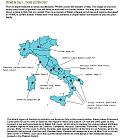 |
||
 |
||
|
News Archives - June 2011 The Latest News…from an Italian American Perspective:
SETTING THE RECORD STRAIGHT ON SINATRA A defense of Frank Sinatra by Italian Americans is warranted. Arguably the world's greatest entertainer and most famous Italian American of them all, Sinatra's reputation remains tainted by allegations of his ties to the mafia. Sinatra, who died 13 years ago, made news last week, his association with organized crime used in defense of First Lady Michele Obama's invitation to the rapper Common at a White House poetry event. Much is said and written about Sinatra's ties to the mafia with little evidentiary support. The FBI monitored and investigated Sinatra over a 40 year period. They concluded that allegations of Sinatra's involvement with organized crime were unfounded and that the singer had a clean record, devoid of any past criminal activity. **** Complying with the Freedom of Information Act, the FBI has become one of the most open and transparent of federal agencies. They have made available to the public scanned copies of inner agency memos, reports, letters, press clippings and other correspondences. Anyone with Internet access can view archived documents of past FBI investigations. The FBI file on Sinatra is massive, over 1,000 pages. As FBI documents show, Sinatra's fame and wealth made him a victim of anonymous death threats, frivolous lawsuits, and unfounded rumors, especially those that he was involved in the mafia. The FBI began monitoring Sinatra as early as 1944 when they questioned parents who threatened to lynch the singer because their daughters skipped school to see his shows. The FBI kept tabs on many civil lawsuits filed against Sinatra throughout his career. Publishing companies initiated most of them claiming copyright infringement and damages in the millions of dollars. All were considered frivolous and dismissed by the courts. The FBI files validate the reputation of Sinatra as a man of considerable compassion who supported numerous charities and promoted better race relations and intercultural understanding. He penned an article in 1946 titled “We're All Americans – We're All Immigrants.” That article later got him in some trouble as it was republished in a Croatian American newspaper employing former communists. Thus, Sinatra was alleged to be a communist sympathizer. The FBI investigated the matter and concluded otherwise. They found Sinatra one of the most patriotic of celebrities who volunteered repeatedly to entertain troops overseas in World War II and the Korean War. Sinatra was dogged for some time over anonymous allegations that he bribed officials $40,000 to obtain a draft deferment in World War II. The FBI found that allegation “baseless.” The physical examination of Sinatra for draft service revealed he suffered from chronic mastoiditis as a child and thus his hearing was injured enough to warrant 4-H draft status. As for allegations that Sinatra had ties to the mafia, the FBI performed an exhaustive investigation. Sinatra was rumored to have been sponsored by mobster Willie Moretti in New Jersey, a bag man for Lucky Luciano in Cuba, and a partner of Sam Giancana's in Las Vegas. The FBI investigation found these allegations unsubstantiated. The FBI investigation kicked into high gear when Ronald Reagan was elected president. White House operatives did not want the president to be embarrassed from his friendship with Sinatra and sought to uncover any connection the singer might have had with the mafia. FBI Agent Jules Bonavolonta was involved in the investigation and wrote about it and other experiences in his book “The Good Guys.” Much was said about photographs taken of Sinatra standing with known figures of the underworld, especially one taken in 1976 backstage at the Westchester Premier Theatre in Tarrytown, New York. Sinatra is seen in that photograph with known members of the Gambino crime family. The FBI delved into the matter and found no connection between Sinatra and organized crime figures beyond photographs and social engagements. Sinatra was one of the most famous and sought after celebrities in the world. He was photographed and socialized with thousands of people, not just gangsters but also politicians, statesmen, foreign ambassadors, members of royalty, businessmen, sports figures, writers, artists and other entertainers. Sinatra was in some ways a victim of guilt by association. His comings and goings were fodder for the rumor mill with allegations of criminal activity by anonymous informants, some of whom were envious of his success. As facts and evidence become less and less relevant in today's media machine, Italian Americans have to remain vigilant in deconstructing allegations of criminality so often lodged against upstanding Italian American citizens such as Frank Sinatra and others. With upheaval in the Middle East, Italy enters another phase in a decades-long challenge of controlling an influx of immigrants; this time refugees from war torn Libya and those escaping turmoil in Egypt and Tunisia. Italy's growing economy and political stability has made her a reliable and safe haven for people seeking a better life from Third World countries. Immigration has divided Italians since the mid-1990s when the rate of undocumented workers and foreign born residents settling there dramatically increased. Debate in parliament, in the press, in the halls of academia, has been ongoing. How welcoming should Italy be of foreign born residents? The last few years has seen a growing tide turn against immigration. Italy has increased border patrols, raided camps and deported thousands of illegal aliens to the applause of the electorate. In 2010, parliament passed a law requiring all work visa applicants to pass a literacy exam. Foreign born residents are now mandated to speak and read Italian. The law, although not unique in Europe, was harshly criticized by immigration rights groups and supporters. Today, seven out of 63 million residents in Italy are immigrants. As immigration increased during the last 15 years, Italy experienced a flipside phenomenon: A mass emigration of native Italians. According to several sources there are 3.5 million Italian citizens living outside Italy today. One of the highest migration rates in Europe, the Italian government has come under pressure to reverse the trend. Some see the mass exodus a symptom of a sick economy. A recent article in Time magazine profiled several young Italians who were pessimistic about future prospects in Italy and left their country for better opportunities abroad. Talk of a national brain drain focuses on the fact that a majority of emigrants are Italians in their 30s and younger. Similarities are made between today's Italian emigrants and those a century or more ago. A closer look, however, reveals little in common between the two exoduses. Today's Italian emigrants aim not to escape a cycle of poverty or dispossession, as did our parents or grandparents, but rather to advance their careers in the global marketplace. Italians are increasingly recruited by domestic and foreign companies to work high paying jobs outside their country. They can be found in charge of faraway factories in China, Australia, and Brazil or working upper management posts for Italian based companies with regional offices in Moscow, London and New York. International political and financial institutions such as the United Nations, the International Monetary Fund and The World Bank employ many Italians. America's industrial cities that gave rise to waves of Italian immigrants in the last century are no longer the destinations of choice for today's Italians. Immigrants from Italy are more likely to reside in white collar service centers in cities such as San Jose, Charlotte, or Washington, D.C. Access to education at all levels has changed the playing field. More young Italians each year graduate high schools and colleges fluent in English. Language barriers have been surpassed by Italians who want to head up new projects and start businesses in the United States, Canada and Australia. The top countries of choice for Italian emigrants are not across the Atlantic but rather over the Alps. The European Union allows Italians the freedom to work anywhere in Europe. Italians have taken up residence in Germany, France and Switzerland. Decades pass as they work different jobs, marry, raise a family and get absorbed by their host country's culture. One telling characteristic of today's Italian emigrants versus those of previous generations is a reluctance to give up their Italian citizenship. Voting in Italian elections remains high among those outside Italy. Italians frequently return home for month long visits. They resist the temptation to abandon their language, their culture and traditions. They are still Italians, no matter where they might call home. |


